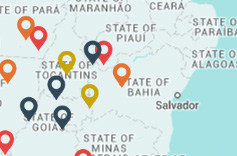Dignitatis – Popular Technical Assistance
The fight of Manoel Mattos: the promotion of human rights and the protection of its defenders
Paraíba
Dignitatis‘ vision is the construction, promotion, realization and reflection about human rights, democracy and peace, as processes of affirmation of the autonomy of peoples, populations, social movements and their organizations. It searches for social justice, ethnic-socio-cultural sustainable development and an egalitarian society.
Over the past 7 years the group advises social movements, the NGO/Aids Forum, the MAB – Movement of People Affected by Dams , the CPT – Pastoral Land Commission, quilombolas (1) and other actors of civil society organizations. The organization reports human rights violations involving death squads in Paraíba and Pernambuco.
Dignitatis was one of the organizations that requested the federalization of the case of Manoel Mattos. Last year it actively worked on monitoring this case with the support of Brazil Fund (2010 Call for Projects). Federalization was an achievement, and the group currently does the follow-up of its repercussions.
The organization is part of the National Network of Popular Lawyers (Renap), the Confederation of Ecuador (Renap-NE), the National Movement for Human Rights (MNDH), the Brazilian Committee of Human Rights Defenders , the Paraíba Forum of NGO/Aids , the Paraíba Committee on Human Rights Education , the State Council for the Defense of the Rights of Men and Citizens of Paraíba , among others.
Context
In Brazil human rights’ defenders are daily murdered or have their lives threatened due to their work. They are victims of death squads, private militias, etc. This is the cruel logic of the ‘social cleansing’, which is taking place especially in the Northeast region, marked by a deep legacy of huge estates and coronelismo (2).
Manoel Mattos’ case is an example of this reality as it shows the power of these groups and the vulnerability of the defenders before them. The case also enables one to think that the work of these defenders has a collective dimension able to articulate not only their vulnerability but also any reality of systematic human rights violations.
The work carried out by Dignitatis – with the support of Brazil Fund – related to the monitoring of the federalization of Manoel Mattos’ case has had important results. The main one is that for the first time in Brazil the displacement of jurisdiction was granted. The experience obtained through the use of this tool needs to be expanded to enhance its use.
The Project
With the 2011 project, Dignitatis plans to disseminate and broaden the debate on the Displacement of Jurisdiction Request, sharing the acquired experience in the claim for the federalization of Manoel Mattos’ case and other crimes committed by death squads.
The work will allow for reflection and debate with the several social actors on the issue of violence against human rights defenders and their vulnerability in Brazil. The plan is to highlight the struggle of those defenders in the fight against the activities of death squads, private militias and police violence in order to contribute to the strengthening of strategies to combat their actions.
(1) N.T.: Quilombola is a person who lives in a quilombo. Quilombo is a century-old
community set up by former slaves in Brazil. ‘The contemporary concept of the remaining communities of quilombos encompasses the prevalence of an autonomous process of production within the communities, based on specific territorialities socially established as a result of acts of resistance.’ (ALMEIDA, Alfredo Wagner. ‘Os quilombolas e a Base de Lançamentos de Foguetes de Alcântara’. Ministry of Environment, Brasília, 2006.)
(2) Coronelismo means the “rule of the coronels”, which is the term referred to the classic boss system under which the control of patronage was centralized in the hands of a locally dominant oligarch known as a coronel, who would dispense favors in return for loyalty.
Funding Line
Annual Call for Proposals
Year
-
Total Granted
-
Duration
-
Main Themes
Guaranteeing the rule of law and criminal justice






